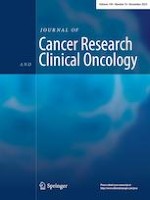Erschienen in:

26.08.2023 | Research
Repeat hepatectomy versus percutaneous ablation for recurrent hepatocellular carcinoma: emphasis on the impact of early or late recurrence
verfasst von:
Chenwei Wang, Kai Li, Zhenkun Huang, Yichuan Yuan, Wei He, Yun Zheng, Ruhai Zou, Binkui Li, Yunfei Yuan, Jiliang Qiu
Erschienen in:
Journal of Cancer Research and Clinical Oncology
|
Ausgabe 16/2023
Einloggen, um Zugang zu erhalten
Abstract
Purpose
Recurrent hepatocellular carcinoma (rHCC) patients with early recurrence usually suffer a poorer prognosis than those with late recurrence. We aimed to compare the treatment efficacy of repeat hepatectomy (RH) and percutaneous ablation (PA) in early-stage rHCC patients with early or late recurrence.
Methods
This retrospective study enrolled 268 patients diagnosed with early-stage rHCC who received RH and PA. Overall survival (OS) and repeat recurrence-free survival (rRFS) were compared using log-rank analysis. Propensity score matching (PSM) was used to reduce the confounding bias.
Results
Among the 268 patients with early-stage rHCC, 79 underwent RH and 189 underwent PA. Early (n = 174) and late (n = 94) recurrence was defined as recurrence within and after 2 years following initial hepatectomy, respectively. For patients with early recurrence, RH and PA provided similar 5-year OS (71.5% versus 74.4%, P = 0.87) and rRFS rates (24.7% versus 24.9%, P = 0.73). For patients with late recurrence, RH resulted in comparable 5-year OS (73.1% versus 86.1%, P = 0.62) and rRFS rates (36.6% versus 27.8%, P = 0.34) as PA. After PSM, RH continued to share similar 5-year OS and rRFS rates with PA in patients with early recurrence, and comparable efficacy of RH and PA was also observed in patients with late recurrence.
Conclusion
RH can offer comparable OS and rRFS rates as PA for early-stage rHCC patients, regardless of whether they experience early or late recurrence. Therefore, both RH and PA are feasible treatment options for early-stage rHCC patients.











